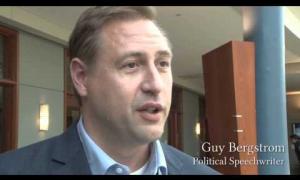Communication coaching? Not for him
May 15, 2019
NFL star J.J. Watt rejected speechwriting help self-righteously. Then why does Peyton Manning rely on it unapologetically?
Former University of Wisconsin football star J.J.Watt has relied on dozens of trainers and coaches to guide him through endless hours in the gym, on the practice field and in the film room to become a great football player.
But, when it comes to giving a speech to a stadium full of people, coaching and careful preparation aren’t for him.
Even though Watt didn’t graduate from Wisconsin—he left a year early to play in the pros—the university chose him to be this year’s commencement speaker. And last month, when administrators asked Watt, now an NFL star, to send them the script he planned to deliver, he refused. “I said, ‘What do you mean?'” Watt told ESPN. “‘I don’t write speeches. I’m just going to go up there and talk.'”
And last Saturday, that’s just what he did at the university’s graduation ceremony, opening his speech by throwing a couple of head-slaps at people who offered assistance:
Maybe I shoulda wrote it down. Professional speechwriters said, “I will help you write your speech.” … And my response was—and I hope I’m right—”I think they asked me to be their speaker because they want to hear what I have to say. Not what you have to say. Not what a speechwriter can write for me. Not what I can sit down and write out over the course of multiple months, and what I think you want to hear.” I think and I hope that you want to hear what I’ve learned throughout my time, and what the University of Wisconsin taught me, what my career has taught me, what some of the things that I’ve been through in my life have taught me. …
And then, blissfully free of the shackles of speechwriting convention, Watt went on to issue forth the sorts of commencement platitudes that speakers have been spewing since the first graduation day at Athens Tech.
Among the bro-mides that Watt didn’t need a speechwriter to help him come up with:
“You should have as big of dreams as you want to have. Don’t ever let anyone tell you otherwise.”
“But to accomplish those dreams, you must be willing to put in the work.”
“The path to your dreams often never goes the way you imagine it will.”
“We all can use a helping hand.”
“Even on your darkest days … you can learn from it, you can grow from it, there is a silver lining that you can find.”
Watt’s speech was fine—in fact, it was better than fine, for a few reasons:
First, Watt brought the right spirit to the occasion. A light mood, and a sincere message.
Watt also illustrated his points with appropriate stories and specific details. He showed vulnerability and candor, even putting himself in his audience’s shoes by admitting that he sometimes sits with a cup of coffee and wonders about his post-playing career: “What the hell am I going to do with the rest of my life?”
Listen for yourself, and I think you’ll agree: J.J. Watt is solid dude and a pretty thoughtful football player who gave a more than passable commencement speech.
How?
As Watt also said in his opening, “Just because I didn’t write a speech down does not mean that I didn’t prepare. I spent time watching YouTube videos from many commencement speeches from many different people. Just like you, I read a whole lot of Wikipedia pages. And last night I crammed it all in and wrote something down on this little piece of paper.”
In short, Watt thought a lot about what he wanted to say, and how he wanted to say it. He has a decent ear for how speeches are supposed to sound, and plenty of confidence in his delivery. That’s not true of many speakers—and it’s why good professional speechwriters will never have to worry about running out of work.
But as J.J. Watt ponders his post-football career, he might consider that part of his earning power could hinge on using his good public speaking instincts to become a great public speaker. For which he could certainly use some coaching, in both the words he delivers and the style in which he delivers them.
Sort of like the coaching and writing help that one of his pro football betters has relied on for almost three decades.
Kathleen Hessert helped Peyton Manning write the speech he gave announcing he was staying at University of Tennessee to play his senior year. And 19 years later, she wrote the emotional speech Manning gave on ESPN, announcing his retirement from the NFL. And she still works with him on the speeches he gives for big bucks on the public speaking circuit.
Of J.J. Watt and his Wisconsin speech, says Hessert, who specializes in writing speeches for sports figures, “He certainly is short-sighted. He will never have that opportunity again in front of those kids and parents who can hire him at very large sums to inspire and incite their audiences.”
Hessert sent me an excerpt from a speech she wrote that Manning is currently giving. “Obviously,” she says, “I got the specific information through collaboration with him and knew the questions to ask to generate this kind of unique content that amplifies his brand, which includes preparedness, demanding of excellence, doing whatever it takes.”
Says Manning in his speech:
I watched endless hours of video including film of our opponents, our own team, and of myself. I was looking for the little things that just might, make a meaningful difference. Sometimes, that meant I would submerge my hand in a bucket of ice water during practice to simulate the frigid temperatures on the field. When I tripped and cost my team a touchdown, the next day I asked the Colts staff to lie down on the field, and try to trip me again! Before important road games I requested raucous crowd noise be piped into practice to approximate the opposing team’s fans, and force the team’s focused attention.
Ask yourself, what are you willing to do to become more successful?
Ask yourself, J.J. Watt. (And you too, CEO and politician and university president.)
You’re welcome to attend the Professional Speechwriters Association’s annual Speechwriting School, where you would learn the final points of how a speaker and a speechwriter work together on a speech, to help the speaker express personal ideas more perfectly (for instance, without saying “shoulda wrote,” at an institution of higher learning).
Or, you could just hire a speechwriter next time—and put in the work—and find out, the way you have as a football player, how good you can be.



